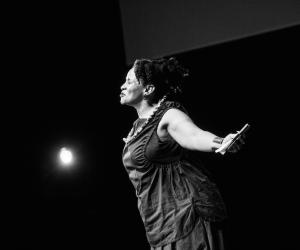Artist Thandiswa Mazwai is inseparable from the South African narrative. That she was born in the Eastern Cape in 1976, the year of the peak of social unrest during Apartheid, is no coincidence.
The music veteran is determined to use her art as a tool for activism, and she is relentless in that pursuit.
Her illustrious career began in 1998 with one of the iconic bands who pioneered the kwaito genre, Bongo Maffin. She won multiple awards with the band, who captured the sense of hope of post-Apartheid South Africa.
Leaving behind hits that are firmly entrenched the South African experience, Mazwai embarked on a solo career with the making of her debut album, Zabalaza, which went on to achieve double platinum status and a string of awards.
She was raised by a political family and was inspired by the writings of Steve Biko, Frantz Fanon, Kwame Nkrumah and Chinua Achebe. This conscious, unapologetically black heritage is part of her narrative and her move to a solo career gave her the freedom to express a more serious side of herself.
“My work gave me an opportunity to share my thoughts and have a meaningful conversation with my generation about Blackness, Africaness, about some of the social ills that plague us, and also about freedom and joy. Music gave me an opportunity to feed my revolutionary self,” she says on her website.
She is not afraid to weaponise her art and her fans are here for it. Nor does her activist stance come at the expense of the magic her sublime tunes emanate. For her New Year’s Eve 2019 performance at Afropunk Johannesburg for example, rain-drenched fans were moved by her charged, African-rooted anthems. A nod to her fierce feminism, their King Tha, she is affectionately known, brought her nipples out to play too.
Her second solo album, Ibokwe, received critical acclaim and solidified her position as “South Africa’s finest female contemporary singer,” according to The Guardian. Her jazz tribute album Belede reimagines South African jazz classics first made popular during the Apartheid years, which she finds are still relevant to the country's current struggles.
Mazwai’s music has a particular preoccupation with the idea of Azania, a place she imagines as complete freedom, a place we’re still yet to reach as a people. This culminated in her 2018 performance, Letter to Azania, which was an exploration of the concept through performance.
It’s another way the rebel singer is lending her voice to the country’s political landscape. This concept of Azania, said to be the country’s first and original name, is a contentious issue in the South African political conversation. Its renaming is considered to be a step in the direction of true decolonisation, not the myth of a decolonised South Africa, so named by its colonisers.
Mazwai has performed across the globe alongside artists like Stevie Wonder, Paul Simon, Hugh Masekela and Skunk Anansie to name a few, and now she joins us back home on the Design Indaba Conference stage next month.
Upcoming Event


